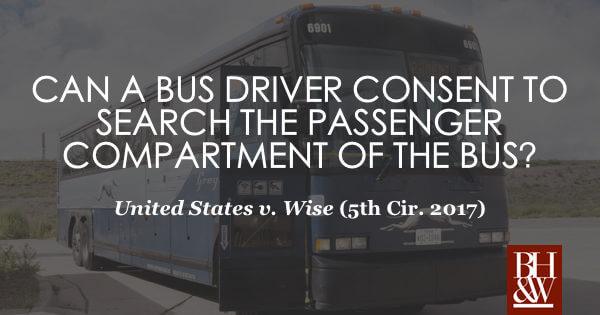Search & Seizure Update | Fort Worth Illegal Search & Seizure Attorneys
 Late in the evening, two San Antonio police officers saw a truck driven by Arthur Warren. The truck matched the description of a vehicle that was suspected of transporting a large shipment of narcotics. When the officers saw Warren’s truck, they observed that the license plate on the trailer was not illuminated, and they saw the truck swerve across the median and across the double white line.
Late in the evening, two San Antonio police officers saw a truck driven by Arthur Warren. The truck matched the description of a vehicle that was suspected of transporting a large shipment of narcotics. When the officers saw Warren’s truck, they observed that the license plate on the trailer was not illuminated, and they saw the truck swerve across the median and across the double white line.
The officers stopped Warren’s vehicle. Officer Dupee testified that he saw a can of beer inside the truck. Officer Galvan asked Warren to get out of the truck, and the officers performed a field sobriety test on Warren.
The officers asked Warren if they could search the truck and trailer. Officer Dupee testified that Warren said, “Yes, go right ahead.” Officer Galvan saw something peculiar as he searched the truck and signaled Officer Dupee to handcuff Warren. Officer Dupee told Warren that he was not under arrest, but he was just being detained. Officer Dupee testified that Warren’s demeanor changed from “nice and compliant” to “upset and depressed.” Warren gave the officers the keys to a compartment where they found marijuana.
Warren testified that he did not give consent to search the truck and trailer, but rather said, “Well, you’re going to anyway.” He further testified that the officers handcuffed him only after he became upset about how they were searching the car on the trailer.
In a pre-trial motion, Warren moved to suppress the evidence (the marijuana) as a violation of his Fourth Amendment protection against unreasonable search and seizure. The trial judge denied the motion. Warren made a plea agreement and received six years deferred adjudication.
On appeal, Warren claimed that the State had failed to prove that he voluntarily consented to the search of his truck and trailer and that any consent that might have been given was tainted because Warren was detained for an extended time.
As with any appellate review of a motion to suppress, the Court of Appeals gave almost total deference to the trial court’s determination of the facts and assessment of credibility of witnesses. The Court then reviewed the trial court’s application of the law to the facts.
An exception to the Fourth Amendment protection against warrantless searches is a search where voluntary, uncoerced consent is given. The State bears the burden of proving that the search was voluntary. Warren argued that the State did not meet this burden.
The trial judge determined Officer Dupee to be credible when he stated that Warren gave consent to the search voluntarily and not under duress. Warren’s claim that he felt he had no choice but to consent was considered, but the Court of Appeals noted that case law provides for a presumption that if someone’s constitutional rights are about to be violated, the individual will assert those rights.
The Court of Appeals gave deference to the trial court’s assessment of Officer Dupee’s and Warren’s credibility and upheld the conclusion that Warren’s consent was voluntary.
As for the length of the detention, the Court noted that police cannot use a traffic stop as a “fishing expedition” to discover unrelated criminal activity. Once the purpose of a traffic stop is satisfied, additional reasonable suspicion is required for further detention. The trial court had found that the detention was initially related to the tip that narcotics were being transported in a vehicle matching the description of Warren’s truck and that Warren’s erratic driving justified the officers investigating whether he was intoxicated.
Even if the officers had satisfied their investigation of Warren’s intoxication, they were justified in continued detention due to the traffic violations they had observed and their observation of Warren’s bloodshot eyes and the beer can in the cab of the truck. Based on the officers’ testimony that Warren had consented to the search of the vehicle, the trial court found that the detention was not extended illegally. The Court of Appeals agreed that the officers had probable cause to initiate the stop, that Warren consented to the search and that the length of the detention was not unreasonable.
This case highlights two principles of Fourth Amendment law. First, while the State is required to prove the voluntary nature of a consent to search, the court is not required to accept the defendant’s position on that issue if the circumstances indicate that consent was voluntary. Second, while police officers may not extend a traffic stop to search for other possible unrelated violations, as long as the officers have reasonable suspicion of illegal activity and are investigating that suspicion, the driver can be detained until the officers’ investigation is complete.
This case reinforces our advice in previous articles…DO NOT GIVE CONSENT TO SEARCH! Make the officers get a warrant. It’s their job and your right!










